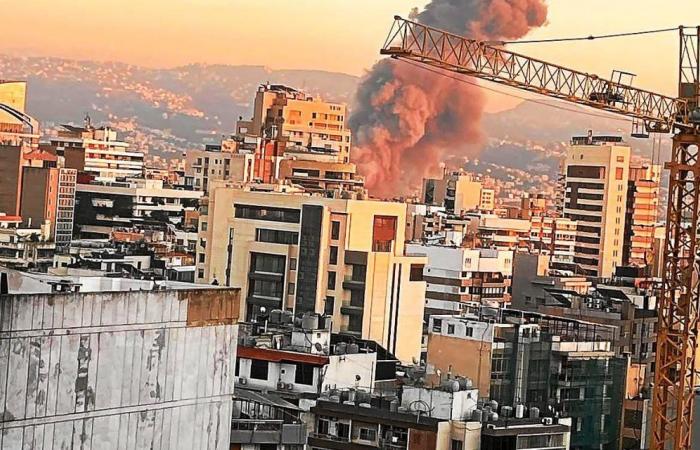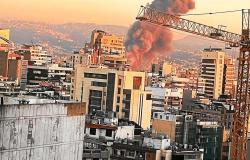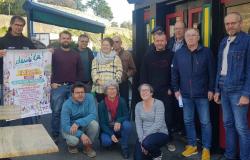
“We felt the earth shake, it happened two kilometers from our home. » From their apartment overlooking Beirut, in the Hamra district, Carole and her family were first struck by the shock of the bombing. Then, behind their window which opens onto the Lebanese capital and the neighboring mountains, they saw an immense column of smoke rising. It was September 30, the day of the first shot by the Israeli army on the inner walls of Beirut, in the Cola district. A new stage in the military escalation between Israel and Hezbollah.
Israeli drones present “morning and evening”
Carole and Sébastien, 45 years old, and their two sons aged 13 and 9, are now confronted, every day, with the peril of war. Confined for a few months in South Lebanon, the conflict “could not be seen or heard from Beirut. We didn’t feel like we were there. But, from the moment the bombings hit the southern suburbs of the city, we see and we hear,” Carole breathes. In their ears, “Israeli drones” also buzz, from morning until evening.
This Brest family has lived in “the city that never dies” since last year. She left Finistère in 2020, first moving to Marrakech – “a great family project”. Lebanon is the second stage of this journey led by the professional progression of Sébastien, technology teacher for AEFE, the Agency for French Education Abroad. When a promotion presented itself at the French high school in Beirut, the family hesitated. “We hadn’t thought about the war but rather about the economic state of the country,” Carole remembers. Contacts made on site “reassured them a little, it seemed possible to us”.
After their move, they discovered a city with “hostile” architecture, “surrounded by buildings, narrow streets, crazy traffic, broken sidewalks and puking trash cans.” But the “life” of their Muslim quarter, the “cultural wealth of Beirut” and its seaside end up winning out.
A fragile charm, broken by the war. “Our neighborhood is, today, full of displaced families who have to rebuild everything. » Sunday walks on the corniche are now “to cry”, “with all these people outside”.
“Don’t do things in a hurry”
The daily lives of these Breton expatriates have been turned upside down: the children’s school closed on September 23 and classes are now held by video. They avoid traveling between neighborhoods, try to keep some fun breaks and do “a little sport, otherwise you lose your temper”.
A life far from their desires. What to do then? Considering themselves poorly informed by the French embassy, they decided to make decisions “individually”. One of the triggers: “Hearing the children talk about the explosions as soon as they wake up. They no longer want to sleep with the window open,” says Carole. Two weeks ago, she therefore chose to book three plane tickets for this Monday, in order to return to Brest. Sébastien will follow them a week later.
For some of their loved ones, it is “unimaginable that we are still here. But we didn’t want to do things in a hurry. I didn’t want the embassy to call us at 3 a.m., only to be on a plane at 9 a.m., with a backpack, the children’s blanket, in our pajamas. It seemed scary to me.” Once in Brest, Carole and her husband want to give themselves time to consider what comes next: “We hope to return to Lebanon, so as not to call into question what we had started to build. But the latest explosion on Thursday (22 dead and nearly 120 injured, editor’s note) does not give me much hope.”





